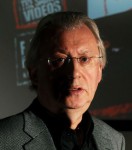GB. 2009. DVD (Region 2 PAL). 105 minutes + extras. BFI DVD. £19.99
 About the Author: Professor Julian Petley is Head of Research, Journalism at Brunel University. His publications include Film and Video Censorship in contemporary Britain (2011, Edinburgh University Press), Pointing the Finger: Islam and Muslims in the British Media (2011, Oneworld) and Censorship: a Beginner's Guide (2009, One World)
About the Author: Professor Julian Petley is Head of Research, Journalism at Brunel University. His publications include Film and Video Censorship in contemporary Britain (2011, Edinburgh University Press), Pointing the Finger: Islam and Muslims in the British Media (2011, Oneworld) and Censorship: a Beginner's Guide (2009, One World)
In 1988, Edward Herman and Noam Chomsky published Manufacturing Consent: the Political Economy of the Mass Media, a book whose ‘propaganda model’ of the media has proved as influential as it is controversial. What this demonstrates, with a wealth of empirical detail, is how massive inequalities of wealth and power, within both the media and the wider society, make it possible to ‘filter out the news fit to print, marginalise dissent, and allow the government and dominant private interests to get their message across to the public’. To this end, they identify five sets of ‘filters’ which squeeze out certain kinds of news and actively encourage he production of others; this they do by fixing the ‘premises of discourse and interpretation, and the definition of what is newsworthy in the first place’.
Made over a period of five years and distilled from more than 120 hours of material, it is a very considerable achievement
These filters consist of ‘size, concentrated ownership, owner wealth, and profit orientation of the dominant mass-media firms’; advertising, to whose requirements much media content is tailored; the governmental and corporate sources on which news organisations are so heavily dependent; the various measures, referred to as ‘flak’ by Herman and Chomsky, which powerful interests mobilise in order to discourage critical media coverage; and anti-Communism, although in today’s post Cold War world this has mutated into a more generalised ideological filter which helps to shape the news in the interests of fighting the ‘war on terror’. Thus are set what Chomsky aptly describes in Necessary Illusions as ‘the bounds on thinkable thought’, and this is this process which Mark Achbar and Peter Wintonick’s film Manufacturing Consent sets out to explain and illustrate.
 Made over a period of five years and distilled from more than 120 hours of material, it is a very considerable achievement. Chomsky is a tireless and lucid exponent of his thesis, but the film is by no means simply a montage of extracts from his global lectures and interviews, and constantly attempts both to conjure and demystify the media landscape of which he is such a stern critic. For the most part this works very well – as, for example, in the ‘operation’ which shows a Times article critical of the genocide in East Timor being surgically turned into a whitewash of the same event by the New York Times. Highly effective, too, is the juxtaposition of Chomsky’s analysis of the media with extracts from various smugly selfcongratulatory documentaries about the ‘free press’. Occasionally, however, there is a slight sense of visual overload, and of the visuals getting in the way of the ideas.
Made over a period of five years and distilled from more than 120 hours of material, it is a very considerable achievement. Chomsky is a tireless and lucid exponent of his thesis, but the film is by no means simply a montage of extracts from his global lectures and interviews, and constantly attempts both to conjure and demystify the media landscape of which he is such a stern critic. For the most part this works very well – as, for example, in the ‘operation’ which shows a Times article critical of the genocide in East Timor being surgically turned into a whitewash of the same event by the New York Times. Highly effective, too, is the juxtaposition of Chomsky’s analysis of the media with extracts from various smugly selfcongratulatory documentaries about the ‘free press’. Occasionally, however, there is a slight sense of visual overload, and of the visuals getting in the way of the ideas.
What the film cannot do, however, is to replicate the sheer weight of empirical detail which makes the arguments propounded by Chomsky in print so compelling. The nearest the film gets to this kind of empirical density is when it contrasts the media coverage of the genocide carried out by the Khmer Rouge in Cambodia with that perpetrated by the Indonesians in East Timor with US and British support – a classic case of the differing media treatment of what Herman and Chomsky call ‘worthy and unworthy victims’.
For all the unremitting rigour of Chomsky’s media critique, Manufacturing Consent is not a pessimistic film. Chomsky, Achbar and Wintonick take particular pains to emphasise the importance of alternative media, and British viewers may feel envious to discover that in the US there are over 800 listener-supported, community and campus radio stations, and over 2200 TV stations of a similar nature. And since the film was first released, the Internet has become a key source of alternative news. These and other recent developments are discussed by Chomsky in a 2007 interview with the film-makers on a very generous disc of extras, which includes unedited versions of some of the interviews excerpted in Manufacturing Consent and a PDF of the book based on the film.
Julian Petley